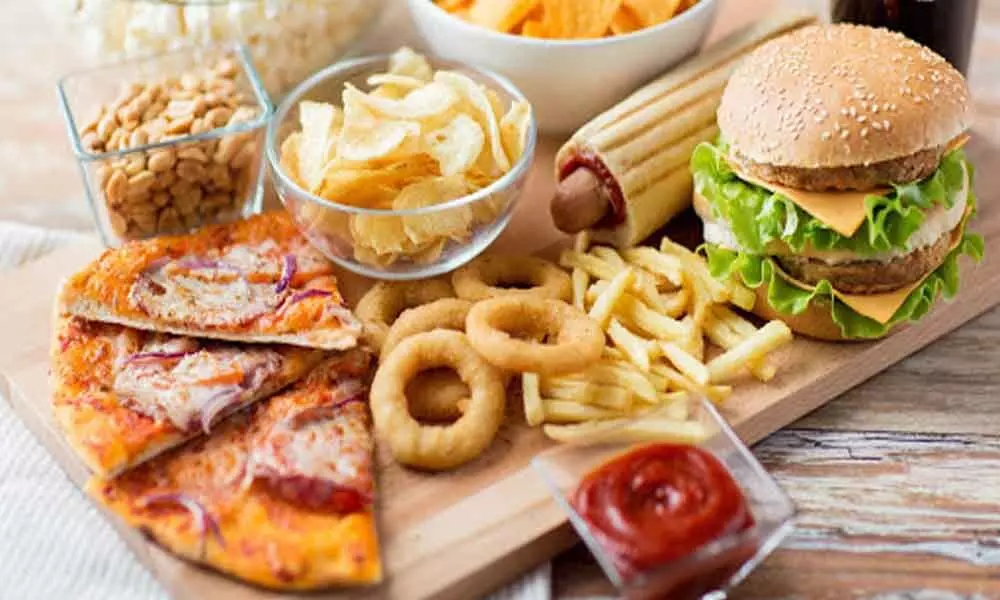Live
- Pushpa Producer Naveen Yerneni Donates Rs. 50 Lakhs to Family of Victim in Sandhya Theater Incident
- NC MP holds anti-reservation protest outside J&K CM’s residence
- Inflation burden eases for farm and rural labourers
- Delhi BJP releases 'chargesheet' against Kejriwal, AAP govt
- The First 40 Days: Sonnalli Seygall’s Thoughts on Traditional Postpartum Care
- CM Nitish Kumar embarks on Pragati Yatra from West Champaran, begins development drive in Bihar
- Rozgar Mela: Recruits from Patna, Panchkula express gratitude to PM Modi for appointment letters
- Tabling CAG reports: BJP legislators move Delhi HC for special Assembly sitting
- Allu Arjun Faces Legal Case; Minister Seethakka Criticizes Lack of Support for Victim’s Family
- Taiwan Excellence announces the Top 3 global winners for Go Green with Taiwan
Just In
How to overcome Binge Eating during Coronavirus lockdown


Binge eating during covid 19 crises is a stress for everyone.
Binge eating during covid 19 crises is a stress for everyone. Routine is disturbed, people with busy life are stuck at home with less of work and no physical activity. During this time the occasionally overeating may become frequently and turns into unhealthy practice.
People who have preference in eating may face anxiety because of food shortage in the supermarket. They may have the fear of consuming high calories and energy dense food (like rice, frozen foods, processed foods etc) and, they may think that food they are eating may not give enough energy which also can increase the anxiety and lead to binge eating.
To reduce the stress level of work from home people may have extra cup of coffee and tea along with some fried snacks at home. With all this when there are no proper physical activity people tend to start storing their excess calories which will lead to weight gain, Diabetes, high cholesterol, high thyroid levels and PCOD problems.
Most individuals become overweight or obese, may results in medical complication like – diabetes, cholesterol, high triglycerides, thyroid level may increase, PCOD problems for females.
Binge eating can be because of various reasons -
• If a person is dieting, they control their food intake to certain point then end up with carving for food and consumes large quantities of food.
• Stress/ anxiety and depression are also some of the reasons for binge eating.
• Special occasion or holiday Binge eating is different.
Tips to overcome Binge eating
Prepare small meals – avoid cooking extra food because you might end up eating more and add extra calories.
Listen to your body's cues – Ask yourself if you are hungry or have a glass of water to see if you are thirsty instead of hungry. During a meal, stop eating before you feel full. It takes a few minutes for your brain to tell your body that it has had enough food, so eat slowly.
Start with a small serving you can always take more if you still feel hungry. Because it controls the wastage of food and not overeat.
Slow down the pace of eating. Eat half, wait for a minute – it will help you chew the food better also enjoy the taste. When we eat food faster tend to eat more without realising it. Eating slow helps body digest food better and keep you full longer.
Have small and frequent meals – eat small meals at regular intervals. This helps body register the hunger level and you can avoid overeating (3 major meals and 2 snacks )
Sharing the food – this also can help you avoid in eating extra calories.
Replacing packed food with healthy food – buttermilk with tetra pack juice, Makana or roasted channa or puffed rice instead of fried snacks etc.
include nuts (like almonds, hazelnuts, and pecans), and seeds (such as pumpkin, sesame) flaxseed oils, and walnuts for snacks
Have a king size breakfast – A healthy breakfast can jumpstart your metabolism, this will keep you full for long and will not feel hunger soon. Eat Healthy carbs (sometimes known as good carbs) include whole grains, beans, fruits, and vegetables. Healthy carbs are digested slowly, helping you feel full longer and keeping blood sugar and insulin levels stable. Avoid: Refined foods such as breads, pastas, and breakfast cereals that are not whole grain.
Be regular – Maintaining proper timing is most important remember regular and healthy meals curbs craving and helps in avoiding weight gain.
Hydration – hydrate with enough water (3 to 4 litres), buttermilk and soups. Avoid sugary drinks, coffee, tea to certain extent.
Exercise -Regular physical activity (indoor activities like yoga which helps you more on breathing and expands lungs with good oxygen support, some stretching, abs exercises to keep your muscle toned alone with some dancing and Zumba for the cardio)
Sleep – a good sleep of 6 to 8 hours is important during this time, they do not follow a discipline practice, they may sleep late wake up late and the routine may get disturbed.
Contributed by Ms. Pavithra N Raj, Chief Dietician, Columbia Asia Referral Hospital Yeshwanthpur

© 2024 Hyderabad Media House Limited/The Hans India. All rights reserved. Powered by hocalwire.com






